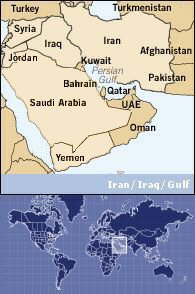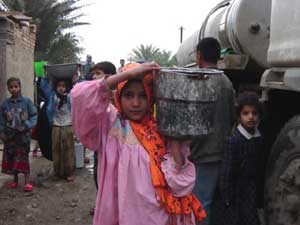
and human security

|
|
 |
|

|
|

|
|

|
|

|
|

|
|
 |
|
 |
|
REGIONAL CONCERNS - IRAQ WCC statements / Other statements / Press releases / Photos / Analysis / Prayers The crisis in Iraq continues to challenge churches on many fronts:
Statements: - WCC statements 15. WCC central committee statement on Iraq crisis: Enhancing peace, accountability and the rule of law (22 February, 2005) 14. WCC statement on church bombings in Iraq (2 August 2004) 13. Statement on Iraq made by the WCC Central Committee meeting 26 August-2 September 200312. Interview with Rev. Dr. Konrad Raiser: "The position of the churches against war has increased their moral standing in society" (4 June 2003) |
IRAQ : Concern at the WCC UN Advocacy Week, NYC 14-19 November 2004  Map courtesy of the International Crisis Group Work of ACT in Iraq   A young girl in the Hai Tarek section of Baghdad during a water distribution partly funded by US-based ACT members (c) Chris Herlinger CWS/ACT International |
11. Konrad Raiser criticizes moral and religious arguments to legitimize war against Iraq: opinion piece published by the International Herald Tribune (8 April 2003)
10. Statement by Rev. Dr. Konrad Raiser, WCC General Secretary, 20 March 2003
9. WCC Executive Committee (18-21 February 2003) statement against military action in Iraq
8. Statement by European church leaders meeting in Berlin on 5 February 2003 to discuss a common response by churches to the threat of military action in Iraq
7. WCC letter on Iraq to the members of the UN Security Council (15 October 2002)
6. Statement on the threats of military action against Iraq, adopted 2 September 2002 by the Central Committee of the WCC, meeting in Geneva, 26 August to 3 September 2002
5. October 24 2002 letter to WCC Central Committee members, member churches, specialized ecumenical agencies, regional ecumenical organizations, and national councils of churches from United Nations Security Council member states
4. 18 February 2000 letter to UN secretary-general Kofi Annan from WCC general secretary Konrad Raiser
3. 1998 report of the delegation of experts in humanitarian need and assessment, public health, human rights, conflict resolution and international policy sent to Iraq by the WCC to study the impact of the UN sanctions regime on the civilian population
2. WCC International Affairs statements regarding the Gulf War (1991)
1. WCC Seventh Assembly statement on the Gulf War, the Middle East and the threat to world peace (Canberra, Australia, February 1991)
26. At the news of Saddam Hussein's death, WCC leader's hopes are for peace and end to violence (30 December 2006)
25. WCC calls for immediate release of peace workers in Iraq (2 December 2005)
24. Iraqi tragedy demands restoration of justice and peace (1 September 2005)
23. Human rights in Iraq: Humanitarian law and human rights experts to examine role of UN and international community (15 March 2005)
22. Middle East church leaders respond to Iraq bombings: solidarity and work for peace needed (2 August 2004)
21. WCC condemns bombing of UN headquarters in Baghdad (20 August 2003)
20. Church leaders question "road map" to peace in the Holy Land, call for increased European involvement in negotiations (6 June 2003)
19. "The position of the churches against war has increased their moral standing in society" (4 June 2003)
18. Church leaders in France to discuss aftermath of Iraq war (2 June 2003)
17. In once forbidden places, find women and children still at war (6 May 2003)
16. Innocent Iraqi children die at hands of those supposed to protect them (15 April 2003)
15. Winning hearts and minds or ensuring impartial aid, by Nils Carstensen (9 April 2003)
14. Konrad Raiser criticizes moral and religious arguments to legitimize war against Iraq (8 April 2003)
13. WCC general secretary challenges Bush's religious claims (21 March 2003)
12. WCC statement on Iraq: "Wars cannot be won, only peace can" (20 March 2003)
11. Iraq crisis: WCC presents church leaders' declaration to UN Security Council (13 March 2003)
10. Day of prayer for peace in Iraq: liturgical resources (28 February 2003)
9. WCC Executive Committee states "Stop threats of war on Iraq!" Supports peace processes in Cyprus and Sri Lanka (21 February 2003)
8. WCC Executive Committee meets in Geneva: Iraq crisis on the agenda (14 February 2003)
7. Church leaders tell Schroeder: war not a legitimate way to resolve conflict (6 February 2003)
6. Church leaders united against war in Iraq (5 February 2003)
5. Iraq crisis: churches to discuss common response (3 February 2003)
4. Iraq: Bishop of Basra to visit WCC (24 January 2003)
3. WCC cautions Iraq, US, UK, France, Russia and China on threatened military action (20 September 2002)
2. Sanctions: the children of Iraq are still dying (2 August 2000)
1. WCC appeals to the United Nations to lift sanctions on the civilian population of Iraq (18 February 2000)

offer key sources of information, analysis, links and other resources for action and advocacy relating to Iraq and visions of peace and calls for reconciliation by the ecumenical family worldwide.